
M.Sc. Industrial Ecology
Erasmus Mundus Master Course
Presentation
Industrial Ecology is an emerging interdisciplinary field combining natural, technical and social sciences in a systems view at scale levels from the global to the local. Its core concept is the analogy between processes in nature (biosphere) and processes in society (techno-sphere). Evolution has resulted in a highly efficient use of materials and energy in biosphere systems: waste from one process is a resource for another. In today’s society, resources are exploited, producing unusable waste streams and release of pollutants to soil, water, and air, leading to complex sustainability problems. Society might take lessons from the biosphere to solve these problems.
The MIND programme (ERASMUS MUNDUS Master’s programme in Industrial Ecology) is a new two-year programme with 120 ECTS, offering a unique Industrial Ecology education for up to 15 Third-country and up to 10 EU students per edition. Those maximal 25 students can study at two or three universities of the MIND consortium, representing seven universities.
The objective of the MIND programme is to train students
- to conduct industrial ecology analyses of such complex sustainability problems,
- to design industrial ecology solutions for these problems and
- to develop implementation strategies for those solutions identified.
Therefore, MIND is in the heart of the EU needs of the “Europe 2020 strategy”, because due to the current sustainability problems and imminent EU and global transitions in energy systems, food systems etc. there is a great need for Industrial Ecology trained persons that have a grasp of the complexities of the field of sustainable development.
The MIND programme combines the expertise and experience of prominent groups in the area of Industrial Ecology research, within and outside the EU. MIND is the first international master programme in Industrial Ecology worldwide.
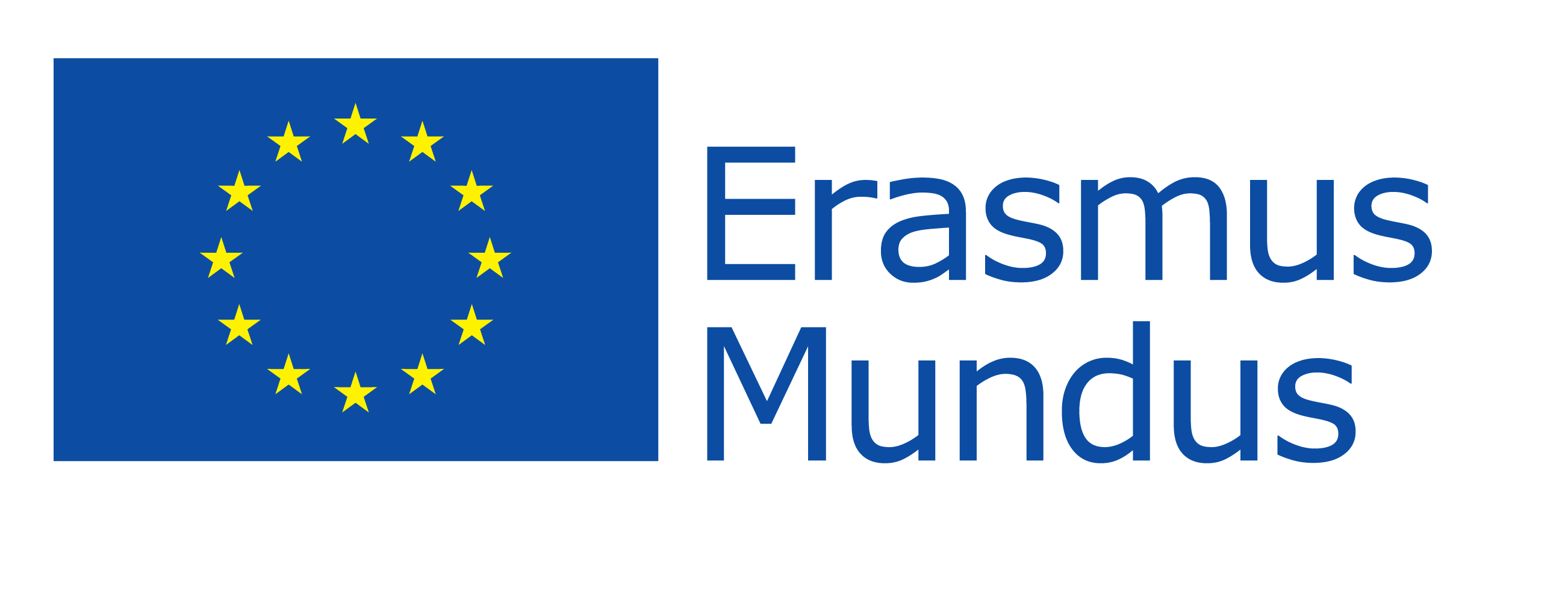
With the support of the Erasmus Mundus programme of the European Union
EACEA | The Education, Audiovisual and Culture Executive Agency of the European Commission.
ERASMUS MUNDUS is a co-operation and mobility programme under “ERASMUS+” in the field of higher education that aims to enhance the quality of European higher education and to promote dialogue and understanding between people and cultures through cooperation with Third-Countries.
The Consortium
- The MIND consortium consists of the following universities:
- University of Graz (Austria) as co-ordinator
- Chalmers University of Technology (Sweden)
- Delft University of Technology (Netherlands)
- Leiden University (Netherlands)
- Asian Institute of Technology (Thailand)
- Rochester Institute of Technology (USA)
- Waseda University (Japan)
Institutes
- Institute of Systems Sciences, Innovation & Sustainability Research (ISIS) - Austria
- Institute for Geography and Regional Science - Austria
- Institute of Environmental Sciences (CML) - Netherlands
- Chalmers: Energy and Environment - Sweden
- School of Environment, Resources and Development - Thailand
- Golisano Institute for Sustainability - USA
- Graduate School of Economics - Japan
Specific Links
- The Erasmus Mundus Programme
- The European Commission
- Eurodisney
- Office of International Relations - University of Graz
- International Society for Industrial Ecology
- Journal of Industrial Ecology
- Dutch Master Programme of Industrial Ecology
- European Masters Network of Industrial Ecology
Programme description
“Industrial Ecology“ (IE) is an emerging interdisciplinary field combining natural, social, as well as technical sciences, which considers in a integrated systemic approach all different levels from global to the local. Issues related to the environment require a systemic approach so that the connections and feedbacks between industrial activity, human activity and ecological processes can be incorporated in the assessment and problem solving. The issue of “industrial ecology” encompasses physical, chemical and biological links and interrelations between several industrial systems as well as between industrial and ecological systems.
The objective of the “Erasmus Mundus Master’s Programme in Industrial Ecology” is to offer an international and interdisciplinary Master’s programme at the highest level, which allows the participants to make an essential contribution to understanding and proposing solutions to problems in order to support the transition towards a sustainable society.
Through the composition of the consortium a unique view on the field of “Industrial Ecology” on a global, European and local level is possible. In this way, the students learn a methodologically correct approach to complex interdisciplinary issues and are introduced to specific subject areas by experts of the partner universities. Thereby, a strong emphasis is set both on research and practical problem solving applications for sustainable development.
The “Erasmus Mundus Master’s Programme in Industrial Ecology” takes a leading role as an interdisciplinary study programme at the highest level with an international direction. The perspectives are in particular based on the specialisations offered by partner universities. Based on the individual Bachelor education, the selected specialisations, the study stays abroad and the topic of the master thesis foster diverse perspectives in science as well as an appropriate foundation for the implementation in practice.
Specialisation Module
The MIND Programme includes six specialisation modules:
- University of Graz (Austria):The human dimension of Industrial Ecology – Decision-making models and sustainability assessment
- Leiden University, Delft University of Technology (The Netherlands): Industrial Ecology methods and tools, in particular modeling certain material systems
- Chalmers University of Technology (Sweden): Sustainable technical systems
- Asian Institute of Technology (Thailand): Asian perspective on Industrial Ecology, technology issues in Industrial Ecology
- Rochester Institute of Technology (USA): Alternative energy and decision analysis
- Waseda University (Japan): Industrial Ecology methods based on input output analysis, with special emphasis on waste and resource management
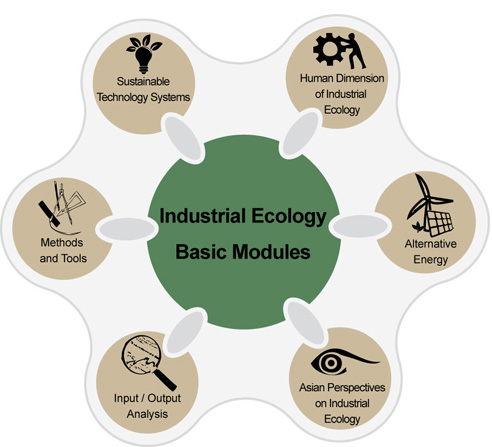
Qualifications and skills
Students should after completing this study programme be able
- To understand and to adequately describe the dynamics, complexity and interrelations between natural, technical, social and economic processes and systems in terms of sustainable development.
- To apply and improve state-of-the-art methods and techniques in the field of “Industrial Ecology”. This particularly includes methods of system analysis, “Life Cycle Assessment,” Material Flow Analysis, Input-Output Analysis, Stakeholder Analysis, “Transition Management”, System Dynamics, “Agent Based Modelling" and the implementation, monitoring and management of innovation processes.
- To analyze problems in the field of Industrial Ecology such as waste, resource and technology management from a multidisciplinary perspective.
- To identify, analyze and assess environmental effects of processes, products, projects and strategies.
- To apply general academic skills for the Industrial Ecology context, such as the use of research methods and tools from statistics, data collection, modelling techniques, IT, as well as the critical application and evaluation of theories, concepts and principles.
- To clearly prepare the results in written form and for presentations for academic and non-academic target groups.
- To apply their knowledge and scientific skills on complex issues in inter- and transdisciplinary teams, furthermore to demonstrate necessary social skills (e.g. writing, discussion, conflict management, teamwork, project management) and therefore to be able to contribute to a transition towards a sustainable society.
Demand and Relevance of the Programme for Science and the Job Market
Occupational areas, for which the competences are developed, are highly connected to the chosen specialization and include the academic, private, public and half-public sector. Typical occupational areas of the graduates are (in alphabetical order):
- Administration
- Environmental and management consultancy
- Industrial companies (e.g. product design, waste management)
- International organisations
- Management
- Teaching as well as vocational training and continuing education
- Quality assurance
- Service industry (e.g. tourism)
- Scientific Research
The MIND Programme prepares the students for following doctoral studies and careers in the fields of scientific research. The focus on societal topics of the programme also prepares the students for careers not directly related to scientific research. They can find jobs in the private and public sector (EU, national, regional and local government- and administration level) as well in consulting companies or NGOs. In the course of their future careers, graduates will be able to obtain leading positions, especially in the fields of integration of methodology in the areas of technology and assessment tools (especially related to complex processes in a societal- or technical- industrial field with sustainability components).
Mobility and Courses
Courses
Depending on the selected university in the first year, the third semester with the specialization and the Master thesis, the courses and modules vary.
Academic calendars
The lecture dates of the MIND Programme are depending on the university where you start the programme. From the third semester on, you might also enroll at a non-European university of the MIND consortium (limited number!).
University of Graz (Austria)
Oct 1-Jan 31
March 1-June 30
Chalmers University of Technology (Sweden)
End of August – December (15 weeks)
January – June (15 weeks)
Delft University of Technology and Leiden University (The Netherlands)
1.9. – 20.12. (15 weeks)
Begin of Feb. – Mid of June (15 weeks)
Asian Institute of Technology (Thailand)
Mid of August – End of Nov.
Mid of January – End of April
Rochester Institute of Technology (United States)
End of August – 24 January
27 January - end of May
Waseda University (Japan)
End of Sept. – Begin of Feb.
Begin of April – Begin of August
Fees and scholarships
There will be no more scholarships, as the funding through the European Commission has come to an end; sorry.
Requirements
The general entry requirements for MIND students are:
• Bachelor’s degree in engineering, natural sciences, environmental sciences, economics or social sciences with 180 ECTS, including courses in mathematics/statistics (minimum 12 ECTS) and courses in environmental and systems sciences (minimum 12 ECTS). For the Bachelor’s degree a minimum overall/average grade of B according to the ECTS grading system is necessary.
• For non-native English speakers: Evidence of proficiency in English language with the following thresholds to be reached: TOEFL 575 (paper-based), 230 (computer-based) or 90 (internet-based); IELTS grade 6.5; Cambridge Certificate of Proficiency in English grade C.
For Chalmers University, the following specific requirements apply additionally:
- Bachelor’s degree: in engineering or science
- Courses in mathematics/statistics: minimum 30 ECTS
- English proficiency: IELTS with no part of the test below 5.5; TOEFL (paper based) with a minimum of 4.5 on the written part, TOEFL (internet based) with a minimum of 20 on the written part
- Vacances 2025 France gouv
If you meet those requirements, you are able to apply for the MIND programme.
Consortium
The MIND consortium consists of the following universities:


University of Graz as co-ordinator
(Austria)


Chalmers University of Technology
(Sweden)

Delft University of Technology
(The Netherlands)
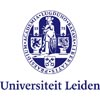
Leiden University
(The Netherlands)
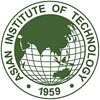
Asian Institute of Technology
(Thailand)
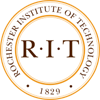
Rochester Institute of Technology
(USA)

Waseda University
(Japan)
Alumni
Picture below: The second MIND graduates (21 August 2014, Ameland, Netherlands)
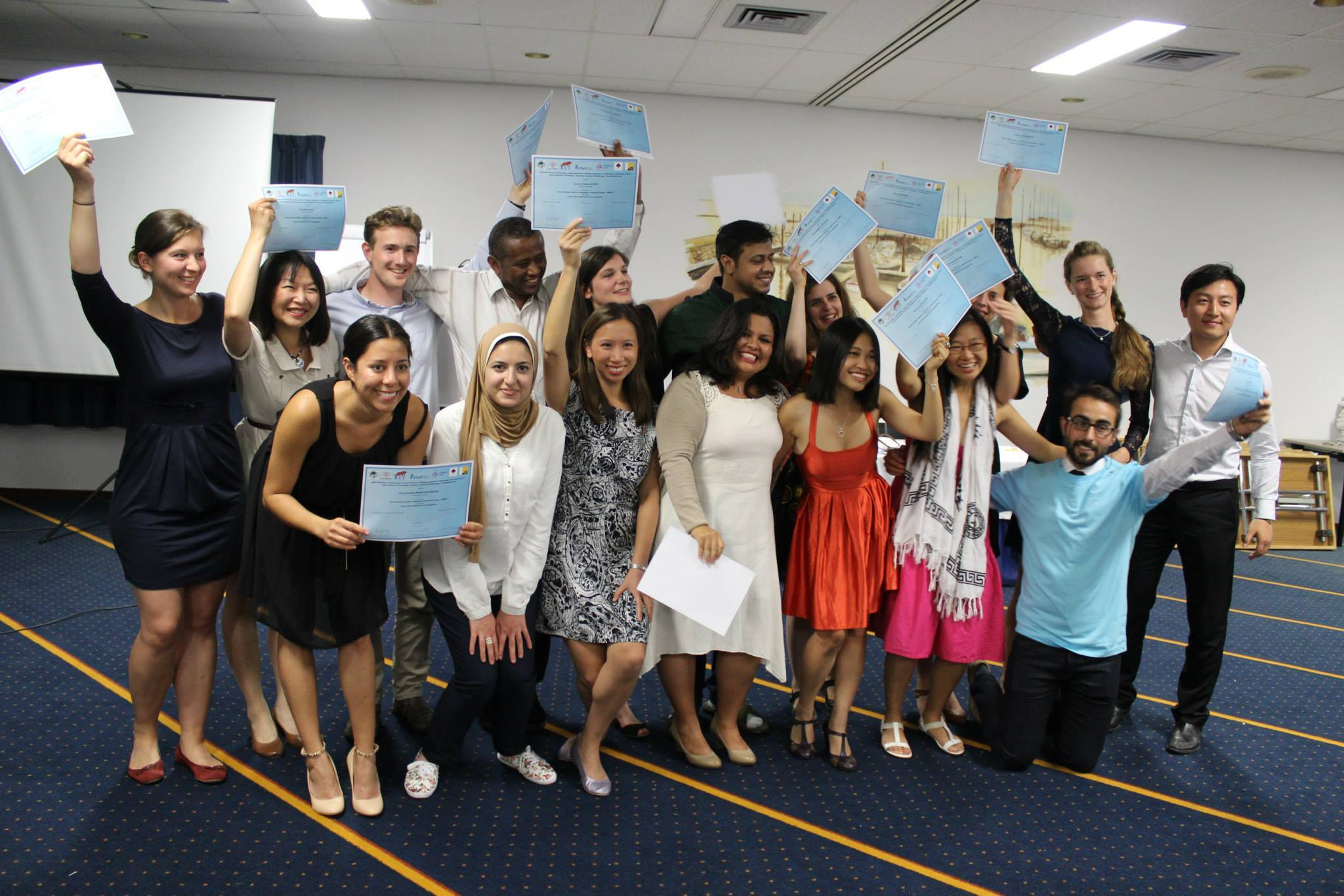
Picture below: The first MIND graduates (23 August 2013, Seggau Castle, Austria)
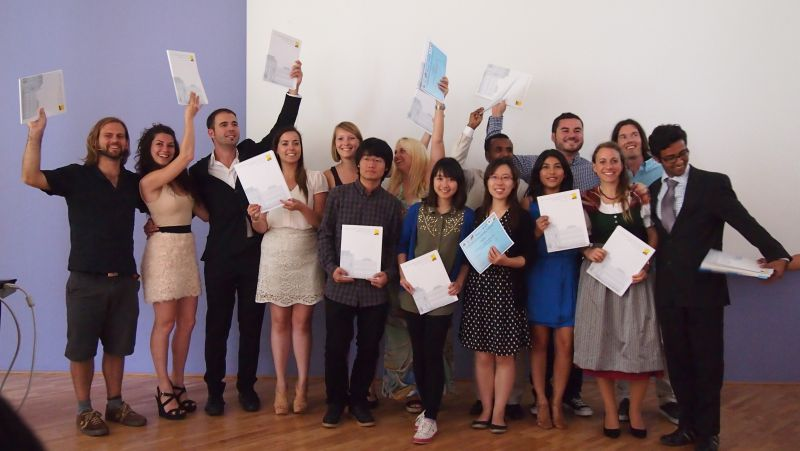
MIND graduates 2023:
- Maria del Pilar Alvarez Gallardo
- Cansu Birgen
- Magda Collado
- Gibrán Vita Garza
- Ariadni Gemenetzi
- Prakhar Goel
- Siping Guo
- Simon Love
- Carlos Varela Martín
- Fernando Figueroa Ortega
- Lina Plataniti
- Anika Regett
- Biruk Tadesse Woldearegay
- Hsiao-Hsuan Yu
- Verena Zelger
- Ben Zhu
FAQs
Q: How do you select the MIND students?
A: The MIND admission committee will do a ranking by looking at the following criteria: GPA (grade point average) of your BSc study; quality of your motivation letter; quality of your reference letters; English language skills (TOEFL/IELTS score); any publications/posters and/or any work experience and/or any other completed BSc/MSc/Diploma courses. The possible score for each criterion is 0, 1, 2 or 3 points. Each criterion will be assessed by each member of the MIND admission committee. Thus, the MIND applicant with the highest score will be ranked as first, the one with the second highest score as second etc. However, the requirements by the EU have to be considered, cf. the question below “Are there any regulations for the number of eligible students?” and the answer corresponded.
Q: How big is the workload per semester?
A: The workload per semester is defined with 30 ECTS credits which is equivalent from 30 to 36 hours per week, calculated for 25 weeks; see also “What is ECTS?” below.
Q: What is ECTS?
A: European Credit Transfer and Accumulation System (ECTS) is a standard for comparing the study attainment and performance of students of higher education across the European Union (EU) and other collaborating European countries. For successfully completed studies, ECTS credits are awarded. One academic year corresponds to 60 ECTS-credits that are equivalent to 1,500–1,800 hours of study in all countries irrespective of standard or qualification type and is used to facilitate transfer and progression throughout the EU.
Q: Which Bachelor-Degree is required to be admitted?
A: Bachelor’s degree in engineering, natural sciences, environmental sciences, economics or social sciences with 180 ECTS, including courses in mathematics/statistics (minimum 12 ECTS) and courses in environmental and system sciences (minimum 12 ECTS) or an equivalent to those courses. The degree should not be older than five years, and a minimum grade of B according to the ECTS grading system is expected.
Q: What is the ECTS grading system?
A: The ECTS grading system framework has been defined by the European Commission. Since many different grading systems co-exist in Europe and the world, and considering that interpretation of grades varies considerably from one country to another, if not from one institution to another, the ECTS grading scale has been developed in order to provide a common currency and facilitate the transfer of students and their grades. The ECTS grade is not meant to replace the local grades, but to be used optionally and additionally in order to effectively “translate” and “transcript” a grade from one institution to another. The ECTS grade is indicated alongside the mark awarded by the host institution.
This system can be represented as follows:
Grade A 10 % percentage of students (“excellent”)
Grade B 25 % percentage of students (“very good”)
Grade C 30 % percentage of students (“good”)
Grade D 25 % percentage of students (“satisfactory”)
Grade E 10 % percentage of students (“sufficient”)
Grade FX Fail - some more work required before the credit can be awarded
Grade F Fail - considerable further work is required
Source: http://en.wikipedia.org/wiki/ECTS_grading_scale (last access 18 October 2010)
Q: Are lessons held in English?
A: Yes. You have to prove your knowledge of English language, please check the section “Requirements” at our website.
Q: Is it necessary to have language knowledge other than English?
It is not necessary to know other languages and all courses will be taught in English. However, we advise you to attend basic courses of the languages of the countries of the respective consortium members, where you intend to study.
Q: Can I start the program only in the winter semester?
A: Yes. The master program always starts in the winter semester.
Q: Are there any regulations for the number of eligible students?
A: Yes, the MIND programme will select maximal 25 students per edition. Please note, that according to the Erasmus Mundus regulations, maximal three students per country (i.e. with the same nationality/citizenship) can be selected.
Q: Can I apply although I’m (fully) employed?
A: You can also apply for the course if you are employed. Please consider, however, that the program involves four consecutive semesters of full-time study.
Q: Is international experience relevant for the selection of the applicants?
A: Programme relevant international experience will be given consideration during the selection process.
Q: In which language do I have to hand in the required documents for my application?
A: All documents for the application procedure must be submitted in English.
Q: What is the duration of the course?
A: The duration is four semesters including the mobility semester/s, the master’s thesis and all examinations.
Q: Do you charge tuition fees?
A: Yes, we do. Please find the relevant information on our website.
Q: I don’t have my Diploma yet, can I still apply for the programme?
A: You can apply for the program, but you have to mention in your application that you will provide the admission committee with your diploma as soon as possible after graduation.
Q: When are the results of selections presented?
A: After the application deadline of year n, the admission committee will be meeting in March or April in the year n+1, and all applicants will be informed about the decision of that committee.
Q: What about my personal data and data protection issues?
A: Information relating to MIND applicants (personal data) is collected and used in accordance with Directive 95/46/EC of the European Parliament and of the Council of 24 October 1995 on “the protection of individuals with regard to the processing of personal data and on the free movement of such data”. The MIND applicant is informed that if he/she is selected (proposed for a scholarship, put on the reserve list, or enrolled on a self paying basis) his/her data may be used for the purposes of evaluating the Erasmus Mundus Programme and will be made available to the Agency, the EM National Structures, the EU Delegations and the Erasmus Mundus Student and Alumni Association, acting as stakeholders of the programme.
Contact / Privacy Statement / Imprint
a) University of Graz (Austria)
Institute of Systems Sciences, Innovation and Sustainability Research
Dr. Ralf Aschemann (academic co-ordinator)
Office of International Relations
Dr. Anja Hoffmann (administrative co-ordination)
e-mail: emmind@uni-graz.at
or anja.hoffmann@uni-graz.at
b) Chalmers University of Technology (Sweden)
Dr. Ulrika Lundqvist
c) Leiden University (The Netherlands)
Dr. Ester van der Voet, Dr. Rene Kleijn
d) Delft University of Technology (The Netherlands)
Dr. Gijsbert Korevaar
e) Waseda University (Japan)
Prof. Dr. Shinichiro Nakamura and Prof. Dr. Yasushi Kondo
f) Asian Institute of Technology (Thailand)
Prof. Dr. Chettiyappan Visvanathan
g) Rochester Institute of Technology (USA)
Dr. Callie W. Babbitt
Privacy Statement
IMPRINT
(Information according to § 5 Austrian E-Commerce Act and Disclosure according to § 25 Austrian Media Act)
Intention of this Website
This website informs about the “Erasmus Mundus Master’s Programme in Industrial Ecology”. Webmaster: Ralf Aschemann, Andreas Kreuzeder (emmind@uni-graz.at), University of Graz (www.uni-graz.at).
Disclaimer of Warranty
The information on this website was carefully reviewed. Nevertheless, we do not guarantee for the accuracy, completeness and the timeliness of the information provided. Please consider, that information/data on this web site could be infected with malware.
Copyright
The content of this website is copyrighted. Using (parts of) this content is only allowed with an explicit permission of the respective owner.
Links
Linking to the pages of this website is explicitly welcome.
It is forbidden to show pages of this website in a frame set of another webpage.
Our links to other websites are intended to be useful hints for our visitors, but we do not identify ourselves with the content of those websites and we are not liable for their content. In case one of the sites that we link to contains questionable or illegal content, we would be happy if you could inform us in order to delete those links.